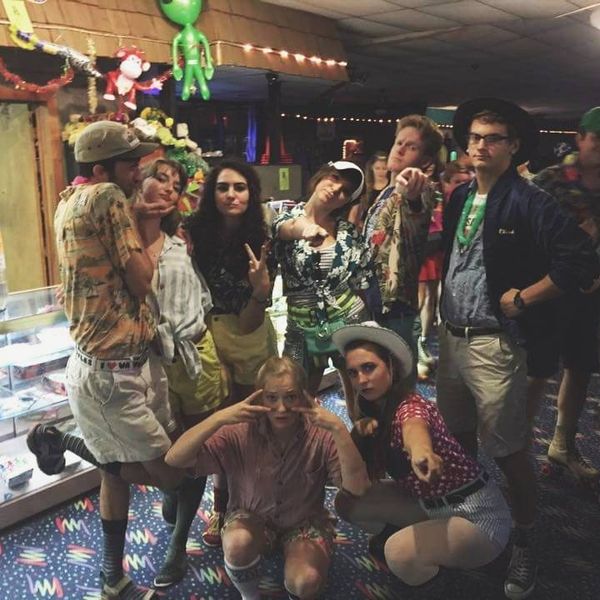In the Western World, we have been trained to assume that institutions such as museums and universities serve as protectors of an unaltered “truth.” Walking through the halls of a museum, we feel as if we are journeying through a world separate from the biases of media or the lies of politicians. We think that we become an audience of raw fact or discoverers of unfiltered information. In reality, however, this utopian assumption is false.
I, myself, have claimed on countless occasions that there are more political goings-on in Binghamton University’s Art History department than there are in the White House, but this is more of a digression rather than a statement of fact. Bias and practices of personal gain tend to spoil our assumptions of institutions such as universities and museums as the guardians of Truth and Knowledge. Many academics bring either skepticism or outdated material into the classroom, especially if they are associated with fringe circles of their discipline. And I am completely fine with this. I welcome outdated material and a healthy amount of skepticism in any academic debate. But there is a new issue creeping into the classroom…one which makes me rather nervous, because the perpetrators of this issue can claim protection from the United States Constitution, and normally slip away from any kinds of censorship.
The topic I am discussing, of course, is an unhealthy amount of academics who belong to fundamentalist religious circles. Now, before I continue, I must make clear that I am not attacking any specific religion in this article. I believe that religion and other systems of belief (which may not wish to be called religions) are essential to understanding culture, art, and natural human psychological needs for spirituality. What I am afraid of, however, is when an individual claims that his or her religious text is a binding contract of exact truth…a contract that everyone must abide by…even students in a classroom.
Whenever I discuss this issue, the conversation usually winds up culminating in a lament for fundamentalists teaching in the science classroom. The late Christopher Hitchens used to frequently comment on how a remarkable percentage of Americans believe literally in a creation story of some sort. This is due to America being one of the few places in the Western World where a grade school teacher could present evolution as if it were some kind of fringe theory. Although I do not think that Christopher Hitchens should be a go-to source for guidelines in education, I believe that when it comes to these comments, he hits the nail right on the head.
But I think there is something far greater emerging. Yes, I want my children to be able to learn about the Big Bang and about Evolution without being led to believe that these are simply “theories.” If I pay for their education, I would like for them to receive one that is not contorted by the religion of their teacher. For some reason, there are plenty of individuals across our country, and across the Anglo-Speaking world, who would argue that I am less of a human, perhaps even less of an American, because I don’t want my child to be able to “choose” if evolution works for their world view. There should be no alternatives offered to my child if there are no alternatives being discussed by scientific disciplines.
Outside of the science classroom, there are other fields of academia that I think would result in even greater danger if permeated by fundamentalists: fields of psychology, gender studies, and philosophy. Imagine, if you will, an individual whose religious scripture argues that love between two members of the same sex is morally wrong. Can this individual make authentic, acceptable contributions to their academic discipline with this worldview? Can this individual present these opinions to a college classroom…or perhaps a high school or grade school classroom? I think not. To think that there are no academics with these kinds of agendas would simply be incorrect.
When I was little, Fiddler on the Roof was a musical with which my father and I were both highly enamored. My father and I all-too-often referenced the famous character Tevye. In Sholem Aleichem’s book Tevye The Dairyman, Tevye is a rather different character than he is in the play. He constantly misquotes scripture, and takes short phrases out of their context. He uses his own misunderstanding of scripture in order to make very important decisions in his life, and in the lives of his family members. His ignorance is meant to be comedic, and the reader is meant to laugh at him, feel sorry for him, and ultimately fall in love with his foppishness. I, too, love the character of Tevye, along with the plethora of mistakes that his slight fundamentalism forces him to make. It adds flavor to his story, and it adds spice to his character. But it is very important to note: Tevye is not teaching the generation of tomorrow in a university classroom.
I end this article by arguing that fundamentalists have no place at the head of a classroom. I ask you, the reader, to strongly consider how you would feel if fundamentalism guided the discussion in a class that was an important building block for your major, and perhaps even your future career. I ask you, again, how you would feel if a grade school teacher considered a centuries-year-old text to be an appropriate moral guideline for your children. Assuming that the notion of Separation of Church and State has kept these kinds of discussions out of classrooms would be gravely incorrect, and such an assumption could greatly affect how your child, and even how you yourself, learns, grows, and acts towards your fellow human beings.



![[Big] Bang for Your Buck: Fundamentalist Academics in 2015](https://www.theodysseyonline.com/media-library/image.jpg?id=56406238&width=980&quality=50)

















